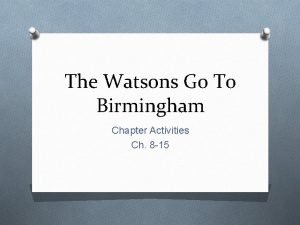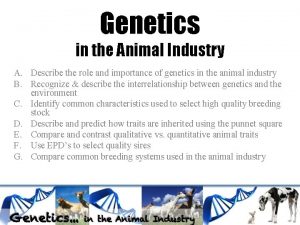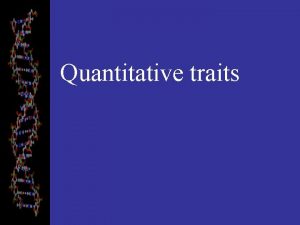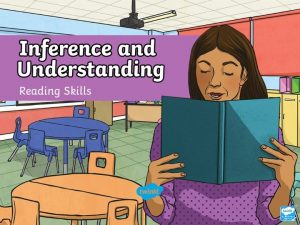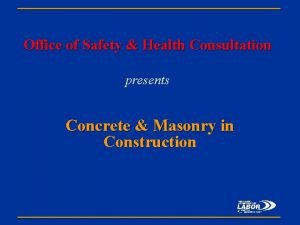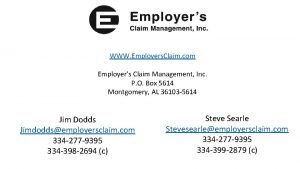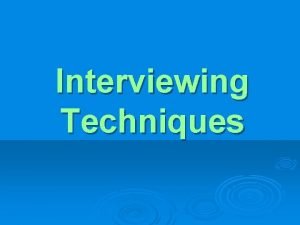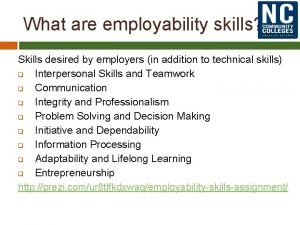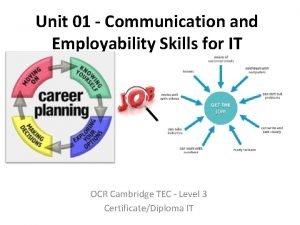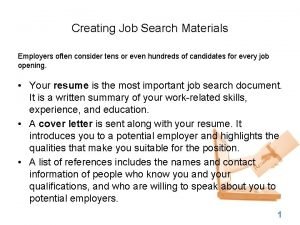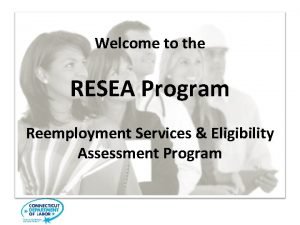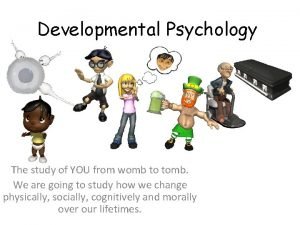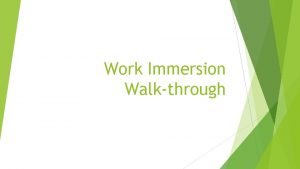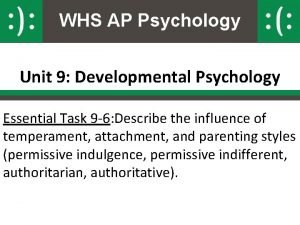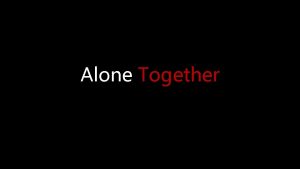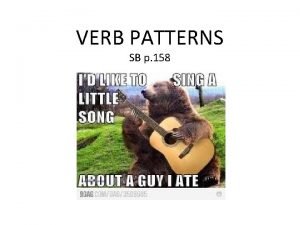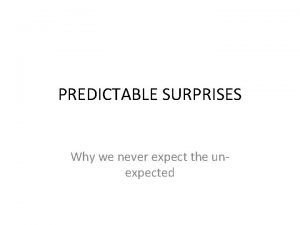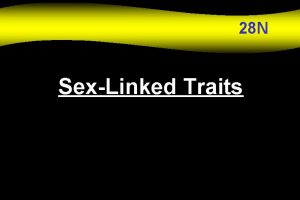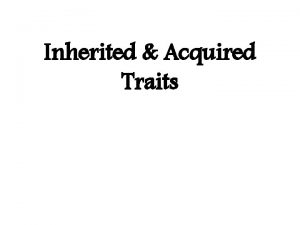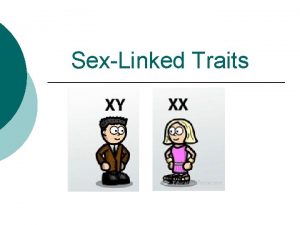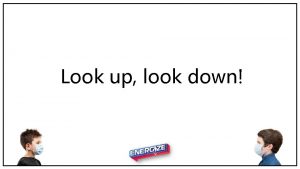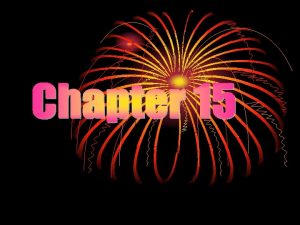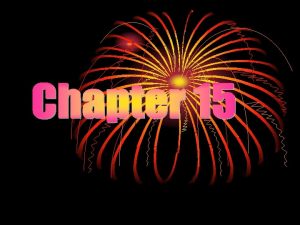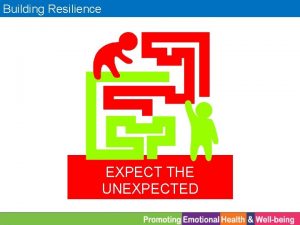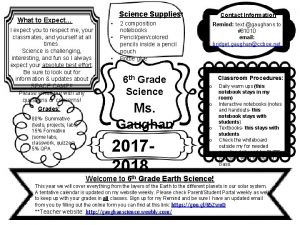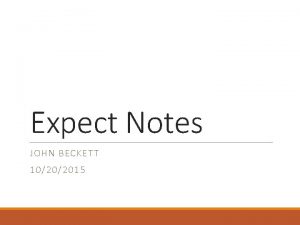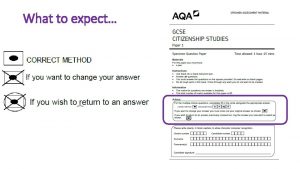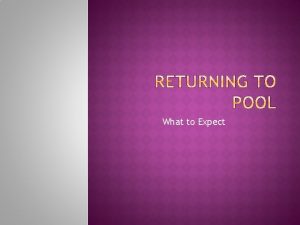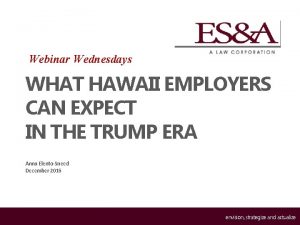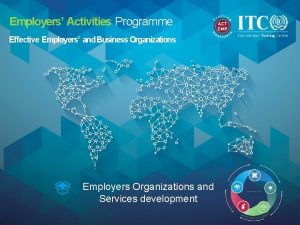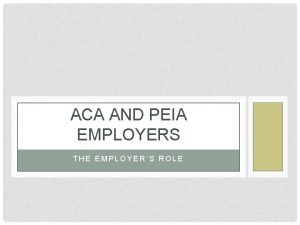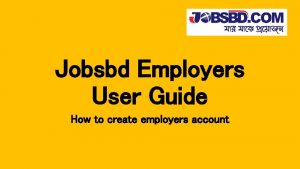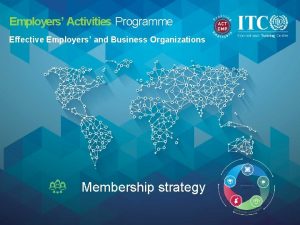What Do Employers Expect Traits Employers Look For































- Slides: 31

What Do Employers Expect?

Traits Employers Look For ü “Soft” or “Interpersonal Skills” üShould be common sense/appear trivial ü Non-technical characteristics

Skills for Success in Workplace ü Communicates clearly with supervisor and others ü Acts professionally ü Learns effectively ü Manages self responsibility ü Plans for change ü Flexibility ü Adaptability

Skills for Success in Workplace ü Plans for personal growth ü Works productively ü Recognizes safe and unsafe work habits ü Demonstrates proper safety procedures ü Maintains a safe and healthy work environment ü Punctuality Taken From the Wisconsin Governor’s Work-Based Learning Board

Network and Communicate ü People need to be able to talk to each other no matter what the setting ü Competitive positions are bolstered if a personal relationship is established for business http: //www. infed. org/about_us. htm

Thinking Creatively ü Even illogically ü Conceive every idea, even if they seem impossible ü The 4 th grader vs. the Seasoned Engineer

Positive Attitude ü Love for the job ü Professional presence that allows others to work alongside one another ü Avoid emotional ruts

Take Educated Risks ü Make some sense üNot long shots ü One person should not bear the brunt of all decisions and risks ü Being Critical

Life-long Learning ü As standards, practices, wants, and needs of a culture evolve, so does engineering and companies ü “Traditional” view

Working With Others ü Members of teams may disagree ü Everyone has different backgrounds, values, training, and other variables that give the team an advantage over similar viewed assembled teams ü Many employers rate this trait as one of the highest in the hiring process

Cooperation Among Members ü Do not necessarily have to be friends ü Make sure you love your job ü Helps create a positive environment ü Increase in productivity

Taking Criticism ü Do not have to like what you hear BUT ü Be receptive to other people’s comments ü Evaluate those comments ü Decide what to do next ü Possess ability to sense tendencies ü Posture says a lot nonverbally

Being Attentive ü Lean forward when person is speaking ü Look at the speaker in (or around) the eyes ü Smile Why penguins make bad listeners. üAt the correct moment ü All are signs of interest in a topic, almost done instinctively http: //bujir_sopi_coac. monblogue. com/main. php

Sarcasm ü “A keen, reproachable expression; a satirical remark uttered with some degree of scorn or contempt. ” ü Avoid using in a business or professional setting

Mental Flexibility ü Each culture has different ideas on business and how things should run ü Adapt when necessary and respect these views ü Shutting off unfamiliar ideas my be shutting off important opportunities

Analytical Thinking ü Ability to comprehend a situation by breaking it into its component parts and identifying the underlying or complex issues

Written and Oral Communication ü Critical skill to possess ü Project documentation and reports needed to transfer information ü When presenting avoid comfort phrases ü “You know” ü “Uh” ü “Like”

Networking ü Ability to find opportunities, develop new contacts, and work with people from many different backgrounds ü Provide advice, lend support, and help get things done http: //www. apage. com. au/cms/take_a_virtual_tour. asp

Self-Discipline ü Take organizational styles to higher level ü Must learn üTime Management üPunctuality üPreparation üOrganization üSpecifics üProtocols üProcedures http: //www. vmi. edu/Show. asp? durki=3178

Experience ü “How do you get experience without a job, and how do you get a job without experience? ” ü Experiential learning has become an important supplement in engineering education ü Combine academic studies with career-related employment opportunities ü Summer jobs, internships, volunteering, research assistantships, on- and off-campus jobs

Myers Briggs Personality Test ü Test developed and copyrighted by Team Technology, headed by Steve Myers ü The results of any of these can be wrong ü Finding what type you are will be valuable information to you in dealing with team development, personal growth, and stress

Myers Briggs Four Questions ü Where, primarily, do you direct your energy? ü How do you prefer to process information? ü How do you prefer to make decisions ü How do you prefer to organize your life?

Where do you direct your energy? ü To the outer world of activity, and spoken words ü Extroversion [E] ü To the inner world of thoughts and emotions ü Introversion [I]

Extroversion vs. Introversion Extroversion (without) ü Social ü Expressive ü Many ü Broad ü Interaction ü Outward ü Action Before Thought Introversion (within) ü Private ü Quiet ü Few ü Deep ü Concentration ü Inward ü Thought Before Action

How do you process information? ü In the form of known facts and familiar terms ü Sensing [S] ü In the form of possibilities or new potential ü i. Ntuition [N]

Sensing vs. i. Ntuition Sensing ü Facts ü Experience ü Practicality ü Present ü Enjoyment ü Realism ü Using i. Ntuition ü Possibilities ü Novelty ü Future ü Aspiration ü Development ü Idealism ü Changing

How do you make decisions? ü On the basis of logic and objective considerations ü Thinking [T] ü On the basis of personal values ü Feeling [F]

Thinking vs. Feeling Thinking ü Analyzing ü Objective ü Logical ü Criticism ü Onlooker ü Decides on principle ü Long term view Feeling ü Sympathizing ü Subjective ü Personal ü Appreciation ü Participant ü Decides using values ü Immediate view

How do you organize your life? ü In a structured way, making decisions and knowing where you stand ü Judgment [J] ü In a flexible way, discovering life as you go along ü Perception [P]

Judgment vs. Perception Judgment ü Close ü Decide ü Structure ü Organize ü Firmness ü Control Perception ü Open ü Explore ü Meander ü Inquire ü Flexibility ü Spontaneity

Working Out Your Preference ü List the letters in a four letter form (ESTJ) ü Insert a question mark for any you are uncertain of ü Two question marks is okay too ü Compare what you written down with the different types starting on Page 215 ü These are only suggestions, you must conclude yourself which you feel comfortable
 Look up to the left
Look up to the left True tone ab 700 ultra glide
True tone ab 700 ultra glide Qualitative traits vs quantitative traits
Qualitative traits vs quantitative traits Quantitative and qualitative traits
Quantitative and qualitative traits Qualitative traits vs quantitative traits
Qualitative traits vs quantitative traits Activity 1.picture identification
Activity 1.picture identification Look at activity 1 and answer
Look at activity 1 and answer Activity 1 a) look at the picture
Activity 1 a) look at the picture A limited access zone must
A limited access zone must Employers claim management
Employers claim management Hemic hawaii
Hemic hawaii Employer rights
Employer rights Interview techniques for employers
Interview techniques for employers Skills desired by employers
Skills desired by employers Disadvantage of using a safe deposit box
Disadvantage of using a safe deposit box Handles on these must not extend beyond
Handles on these must not extend beyond Federation of european social employers
Federation of european social employers Personal attributes valued by employers
Personal attributes valued by employers Explain why employers often
Explain why employers often Protruding reinforced steel must be guarded
Protruding reinforced steel must be guarded What to expect at resea appointment
What to expect at resea appointment Beowulf anticipation guide
Beowulf anticipation guide Womb to tomb psychology
Womb to tomb psychology Food and beverage directors expect a pour cost of
Food and beverage directors expect a pour cost of Work immersion objective
Work immersion objective Improve 3. hali
Improve 3. hali Parents impose rules and expect obedience
Parents impose rules and expect obedience Sqprs
Sqprs Alone together book
Alone together book Forget verb pattern
Forget verb pattern Expect tool
Expect tool Never be predictable
Never be predictable

